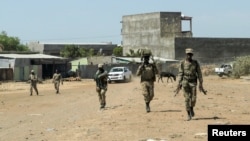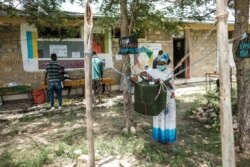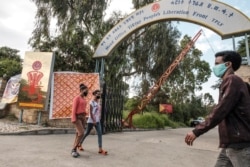Ethiopia's military conflict with its independence-minded Tigray region has raised fears of civil war in Africa’s second most populous nation. It also raises concerns about regional instability spreading if the conflict continues.
The conflict between the Ethiopian government and fighters loyal to the Tigray People’s Liberation Front is entering its second week. Some 8,000 Ethiopians have crossed into Sudan for safety and aid agencies expect more in the coming days.
The conflict started when Tigray fighters attacked a federal government position last week in what the government called an attempt to loot weapons and equipment. Prime Minister Abiy Ahmed ordered military action to end the armed uprising.
Comfort Ero is the International Crisis Group Africa Program director.
“Right now what we see is more fighting, more entrenched positions by both sides. Even if the Tigray forces are squeezed and overpowered you may see a strong resistance attack, a guerilla type attack resistance and that’s possible. We don’t see the Tigrayans being governed anytime soon from Addis, and we could be looking at a long, protracted situation,” said Ero.
Tensions have been building since September, when Tigray region, one of Ethiopia’s nine regional states, defiantly held a local election after Abiy postponed the polls due to the COVID-19 pandemic.
There has been less information coming from the conflict area and difficulty assessing humanitarian needs since the government shut down the internet Wednesday.
Thomas Murphy is a sub-Saharan Africa Intelligence analyst for the Risk Advisory group. He said government failure to defeat the Tigray Fighters may cause more trouble for the country.
“The likelihood of a coup would almost certainly increase if the military fails to defeat the TPLF. That would probably come from factions linked to the TPLF who have previously been highly influential in the government. In terms of wider implications, Ethiopia is in a very fragile state at the moment, and I think the likelihood, the potential for tensions to escalate or deteriorate into pockets of conflict involving other ethnic actors across the country is probably very high.” he said.
On Sunday, the prime minister appointed a new army chief and intelligence head to lead the war against the Tigray region.
Political expert Awol Allo said solving the country’s problems through guns could divide the country even further.
“This is a highly divided country along ethnic lines. The current constitution provides people the right to self-determination in the sense of the ability to determine their political and cultural status, but also the right to be an independent state. So, the decision of the prime minister to settle a political dispute through an armed confrontation would likely lead to the disintegration of the Ethiopian state into multiple small republics, and that, of course, would have a considerable ramification not just for Ethiopia but also for the horn of Africa,” said Allo.
In 2019, Abiy won the Nobel Peace Prize for his effort to end Ethiopia's hostilities with Eritrea, bringing political reform to the country and mediating disputes in Sudan, South Sudan, Kenya, and Somalia.
Abiy has ruled out talks with the Tigray regional leaders, but Ero of ICG said comprehensive national dialogue could save Ethiopia and the region.
“The continental body in the form of African Union, one of the most important allies for the African Union, but also for Ethiopia, for EU, are all on the same page in terms of what needs to be done to prevent this conflict from spreading out of control and from sucking in the region where we already have a very fragile transition in Sudan, a country like Somalia about to turn an important page in its own, the crisis in South Sudan in its own slow transition and new unity government. So this is not a good time for the Horn of Africa region with one of its most important, pivotal countries now going into a war footing,” said Ero.
The government in Addis Ababa insists the military operation will end when the north of the country is liberated and new leadership is restored in the region.






